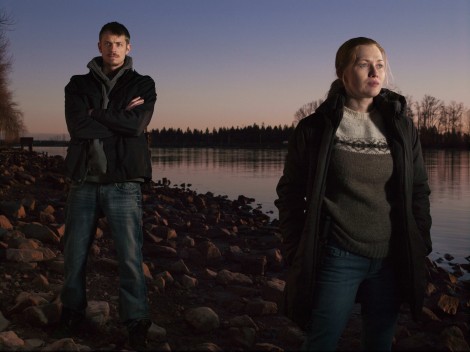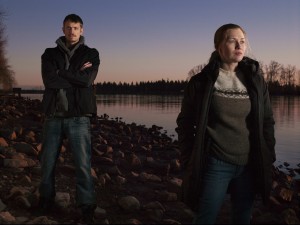‘The Killing’ finale kills audiences, but that’s a good thing
SPOILER ALERT: You’ve been warned.
The Killing’s season one finale split audiences down the middle. Many editorial reviews and blog posts around the Internet cried foul at the cliffhanger ending that still left the mystery over Rosie Larsen’s murder a question mark. Others, including myself, appreciated the gotcha ending, if for no other reason than it promises to continue this great television show down a similar track as the inaugural season.

“Orpheus Descending,” which finished the 13-episode first season, finds Detective Sarah Linden (Mireille Enos) still in the apartment of mayoral candidate, Darren Richmond (Billy Campbell). She has stumbled upon his Orpheus-prostitution ties via his e-mail account, which seems to point toward the fact that he murdered Rosie. However, Linden and her partner, Detective Stephen Holder (Joel Kinnaman), need some physical evidence.
Researching the facts of the case one last time, Holder realizes there is a discrepancy in the mileage of the campaign car that Rosie was found in. There are far too many miles on the odometer, and the gas tank is nearly full. These revelations don’t support their initial theory.
So, tracking a new route from the Beau Soleil casino, where Rosie was spotted at an ATM, the detectives realize that the killer must have taken a different road around the lake, and not the ferry. They follow the route and request to see the security footage from the toll camera on a nearby bridge.
Eventually they stumble upon a rundown gas station, in which the attendant remembers the campaign car in question pulling up on the night of the murder for a fill-up. Linden takes her curiosity one step further and begins to inspect the wooded area around the gas station. What she finds is evidence of Rosie’s final hours: an apparent struggle through the woods, all the way to her final resting spot at the bottom of a lake.
It’s at this time that we get some of the finest acting from Enos. Upon finding one of Rosie’s shoes in a clearing, she breaks down, questioning why the girl had to die. One different decision and she may have lived. Let’s throw some Emmy love toward this breakout performance.
These new threads in the case come after the detectives investigated Darren’s past flings. Apparently, he has a track record of “darkness” with the women he takes to bed. One of these old haunts comes forward to Gwen, Darren’s campaign aide and current fling, telling her of the councilman’s past indiscretions. Gwen begins to put the pieces together and decides to tell Linden that Darren came home the night of the murder with wet clothes (Rosie was found in a lake).
The icing on the guilty cake comes in the form of the toll-booth security footage. Holder hands over the tape showing Darren in the campaign car on the night of the murder crossing the bridge.
The detectives swoop in right after Darren holds an enthusiastic campaign rally. They arrest him for the murder of Rosie Larsen and conclusion seems to be hanging in the air.
While all of these loose ends are being tied up, Rosie’s parents continue to grieve. Stan Larsen (Brent Sexton) has been released from jail after he beat Ahmed, Rosie’s teacher, to a bloody pulp. Mitch Larsen (Michelle Forbes) has decided to leave her family, unable to face the reality of her new life.
Everything seems to come to an end. Heck, even Linden and her son board a plane headed for California and a different life.
But then two shockers get squeezed in before the credits roll.
One: Belko Royce (Brendan Sexton III) takes a gun and aims it at Darren during his perp walk. The entire scene has a Jack Ruby-Lee Harvey Oswald feel.
Two: Linden receives a call on her cell phone right before her plane takes off. The call is from the toll booth operator. Apparently, the security cameras haven’t been working for some time. There’s no way they could have secured evidence showing Darren in the campaign car. This obviously implicates Holder, the one who stepped forward with the evidence. One of the final shots is of Holder sitting in a car talking to someone about how well the fake evidence was believed.
Now, I understand how dedicated fans of the show could be upset over these last-minute revelations. Not only does this leave Rosie’s murder up in the air, but it also breaks a fundamental rule of fiction: Why lead us down one rabbit hole, when your intention is to change everything and reveal another rabbit hole?
The reason this ending works is completely personal: I was genuinely shocked by the turn of the events. We all knew that Holder has unorthodox ways to his detective work, and this confirms that fact. It doesn’t mean that Holder is the killer, or even that he knows who the killer is. What it does confirm is that he is working for someone else (likely Darren’s political opponent, Mayor Lesley Adams) and that he will cross a line to implicate anyone he believes is guilty.
The Belko Royce development is less successful in my mind. I understand the need to leave the Darren thread on a cliffhanger, but I find it incredibly unlikely that there would be such a public perp walk for a mayoral candidate. Also, by getting rid of Darren, the show will be getting rid of one of its better characters. I know I’m a sucker for nostalgia, but it would be great if all the central characters could stick around for a second season. Even Mitch, who apparently is headed toward suicide or permanent seclusion, will be sorely missed.
The Killing is still the best new series of the year, and what the finale proves is that the show has some balls. For an hour-long drama that proved slow, methodical and brilliant over the 13 days (13 episodes) following Rosie’s murder, the finale threw in some unexpected fireworks. Perhaps this sudden change of pace was too startling for devoted audience members. And I can appreciate that fact.
The Killing prides itself on not being another Criminal Minds or Law & Order. Everything on this show is earned through vivid characterization and truthful storytelling. The finale adds in a little dramatic spice (and perhaps some far-fetched plot developments).
But why fault a show for finding a stronger pulse in the season finale? Did we all really expect The Killing to end with definitive catharsis? This is the show of uncompromising reality, and that’s why I continue to love it.
For those who decry that the audience was due a proper payoff: You should realize what type of show you are watching. The Killing kills the competition by being unconventional. Nothing is (or should be) as it seems.
By John Soltes / Publisher / John@HollywoodSoapbox.com-
The Killing
-
AMC, Sundays at 10 p.m.
-
Created by Veena Sud, based on the Danish series Forbrydelsen
-
Starring Mireille Enos, Joel Kinnaman, Billy Campbell and Michelle Forbes
-
Bubble score: 4 out of 4
-
Click here for more information.
-
Click here for a mid-season report on The Killing.
-
Click here for an early-season report on The Killing.

